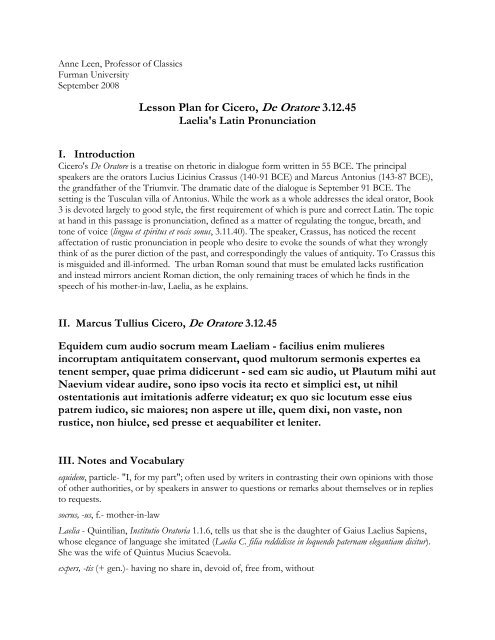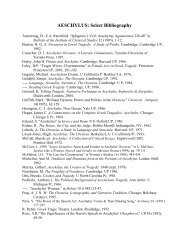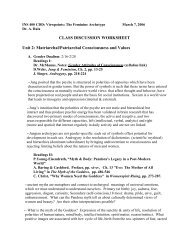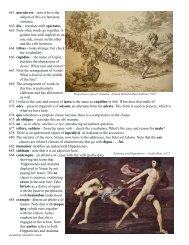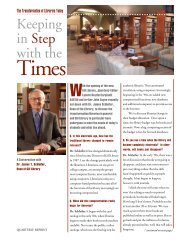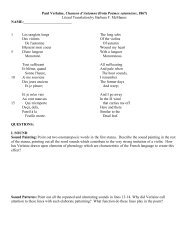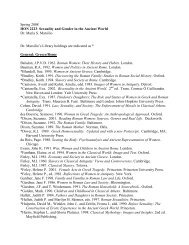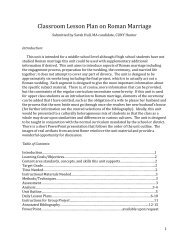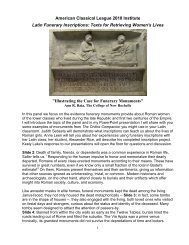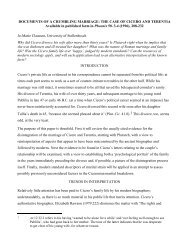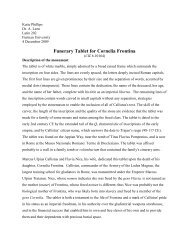A Lesson for Cicero De Oratore 3,12.45: Laelia
A Lesson for Cicero De Oratore 3,12.45: Laelia
A Lesson for Cicero De Oratore 3,12.45: Laelia
Create successful ePaper yourself
Turn your PDF publications into a flip-book with our unique Google optimized e-Paper software.
Anne Leen, Professor of Classics<br />
Furman University<br />
September 2008<br />
<strong>Lesson</strong> Plan <strong>for</strong> <strong>Cicero</strong>, <strong>De</strong> <strong>Oratore</strong> 3.<strong>12.45</strong><br />
<strong>Laelia</strong>'s Latin Pronunciation<br />
I. Introduction<br />
<strong>Cicero</strong>'s <strong>De</strong> <strong>Oratore</strong> is a treatise on rhetoric in dialogue <strong>for</strong>m written in 55 BCE. The principal<br />
speakers are the orators Lucius Licinius Crassus (140-91 BCE) and Marcus Antonius (143-87 BCE),<br />
the grandfather of the Triumvir. The dramatic date of the dialogue is September 91 BCE. The<br />
setting is the Tusculan villa of Antonius. While the work as a whole addresses the ideal orator, Book<br />
3 is devoted largely to good style, the first requirement of which is pure and correct Latin. The topic<br />
at hand in this passage is pronunciation, defined as a matter of regulating the tongue, breath, and<br />
tone of voice (lingua et spiritus et vocis sonus, 3.11.40). The speaker, Crassus, has noticed the recent<br />
affectation of rustic pronunciation in people who desire to evoke the sounds of what they wrongly<br />
think of as the purer diction of the past, and correspondingly the values of antiquity. To Crassus this<br />
is misguided and ill-in<strong>for</strong>med. The urban Roman sound that must be emulated lacks rustification<br />
and instead mirrors ancient Roman diction, the only remaining traces of which he finds in the<br />
speech of his mother-in-law, <strong>Laelia</strong>, as he explains.<br />
II. Marcus Tullius <strong>Cicero</strong>, <strong>De</strong> <strong>Oratore</strong> 3.<strong>12.45</strong><br />
Equidem cum audio socrum meam <strong>Laelia</strong>m - facilius enim mulieres<br />
incorruptam antiquitatem conservant, quod multorum sermonis expertes ea<br />
tenent semper, quae prima didicerunt - sed eam sic audio, ut Plautum mihi aut<br />
Naevium videar audire, sono ipso vocis ita recto et simplici est, ut nihil<br />
ostentationis aut imitationis adferre videatur; ex quo sic locutum esse eius<br />
patrem iudico, sic maiores; non aspere ut ille, quem dixi, non vaste, non<br />
rustice, non hiulce, sed presse et aequabiliter et leniter.<br />
III. Notes and Vocabulary<br />
equidem, particle- "I, <strong>for</strong> my part"; often used by writers in contrasting their own opinions with those<br />
of other authorities, or by speakers in answer to questions or remarks about themselves or in replies<br />
to requests.<br />
socrus, -us, f.- mother-in-law<br />
<strong>Laelia</strong> - Quintilian, Institutio Oratoria 1.1.6, tells us that she is the daughter of Gaius Laelius Sapiens,<br />
whose elegance of language she imitated (<strong>Laelia</strong> C. filia reddidisse in loquendo paternam elegantiam dicitur).<br />
She was the wife of Quintus Mucius Scaevola.<br />
expers, -tis (+ gen.)- having no share in, devoid of, free from, without
disco, discere, didici- to learn<br />
Plautus, Titus Maccius (c. 254-184 BCE.)-the earliest Roman playwright whose comedies survive.<br />
Quintilian 10.1.99 tells us that the earliest Roman philologist, Aelius Stilo (144-70 BCE), considered<br />
Plautus's Latin so superb that, he claimed, if the Muses spoke Latin they would speak in the language<br />
of Plautus (Licet Varro Musas, Aelii Stilonis sententia, Plautino dicat sermone locuturas fuisse, si Latine loqui<br />
vellent.)<br />
Naevius, Gnaeus (c. 270-c. 199 BCE)- an early Roman poet and author of tragedies, comedies, and an<br />
epic in Saturnian verse. He is regarded as one of the founders of Roman satire.<br />
sono ipso . . . recto et simplici est- ablative of quality; the subject of est is <strong>Laelia</strong><br />
rectus, -a, -um- straight-<strong>for</strong>ward, direct<br />
simplex, -icis- simple<br />
ostentationis aut imitationis- partitive genitives following nihil<br />
aspere- adverb, with a harsh sound; in an unrefined manner, coarsely, roughly<br />
ex quo- "where<strong>for</strong>e," "from which fact;" the antecedent is the preceding sentence, from which<br />
Crassus draws this inference<br />
ille, quem dixi- Lucius Aurelius Cotta, mentioned in 3.11.42, where <strong>Cicero</strong> criticizes his heavy tone<br />
and rustic pronunciation (gravitate linguae sonoque vocis agresti). Cf. also 2.22.91 and <strong>Cicero</strong>, Brutus 259,<br />
where Cotta's pronunciation is also mentioned.<br />
vaste- adverb, without refinement, broadly, coarsely. This and the following five adverbs are here<br />
defined with regard to pronunciation.<br />
rustice- adverb, sounding like, a countryman, in a provincial fashion<br />
hiulce- adverb, disconnectedly, disjointedly<br />
non vaste, non rustice, non hiulce- Note how anaphora and asyndeton emphasize the stylistic flaws and<br />
imitate the harshness of such pronunciation, faults that <strong>Laelia</strong>'s father and ancestors lack, as <strong>Cicero</strong><br />
goes on to illustrate.<br />
presse- adverb, in a concise or restrained style<br />
aequabiliter- adverb, regularly, smoothly<br />
leniter- adverb, with a smooth sound, so as not to jar on the ear<br />
sed presse et aequabiliter et leniter - polysyndeton lends rhythm to Crassus's words and models the virtue<br />
under discussion.<br />
IV. Comprehension Questions<br />
1. What is the meaning of incorruptam antiquitatem? Why do women more readily preserve this<br />
value, according to Crassus?<br />
2. What qualities of <strong>Laelia</strong>'s Latinity recall Plautus and Naevius?<br />
3. How did <strong>Laelia</strong>'s father and ancestors speak?<br />
4. What are the defects of pronunciation listed by Crassus? What are its virtues?
V. Discussion Questions<br />
1. What does Crassus mean when he describes women as multorum sermonis expertes? Is he<br />
generalizing about all Roman women, or is he speaking only of the elite? Does this refer to<br />
elite women's lack of exposure to others? Or does it refer to the fact that they consort only<br />
with other elites and so do not have the opportunity to speak with the vulgi on the streets or<br />
the rustici from the country?<br />
2. From what Crassus says about the Latin of Plautus, Naevius, and her father and ancestors,<br />
how might we reconstruct the way <strong>Laelia</strong> talked? If her Latin is not affected or imitative, as<br />
Crassus says, how likely is it that she spoke literary Latin (Plautus and Naevius), or like an<br />
older man, without contributing any qualities of her own?<br />
3. Why is <strong>Laelia</strong>'s pronunciation described exclusively in terms of her male relations? What role<br />
might her mother have played as a model of pronunciation?<br />
4. What does this passage have to say about the relationship between elite fathers and<br />
daughters in ancient Rome?<br />
5. How many values of correct pronunciation are also moral values? What does this equation<br />
suggest to you about the value of correct pronunciation and style in <strong>Cicero</strong>'s time?<br />
6. What roles do accent and pronunciation play in our evaluation of a person today, whether of<br />
his/her style of speech, substance of argument, or personal character?<br />
7. Can you think of anyone today who is so isolated from mainstream culture that he or she<br />
preserves an antiquated style of speech? How do we judge this person's speech? Would it<br />
provide the model <strong>for</strong> us that Crassus found in <strong>Laelia</strong>'s Latin?<br />
VI. Suggested Extra Activities<br />
1. Read in Latin or English Quintilian, Institutiones 1.1. 4 and 6 (Worlds of Roman Women, p. 33),<br />
where Quintilian discusses Cornelia and Hortensia as well as <strong>Laelia</strong>. Compare what Quintilian<br />
says there about the role of the materfamilias in ensuring the correct diction of her sons with what<br />
Crassus suggests were <strong>Laelia</strong>'s models.<br />
2. Read in Latin or English Tacitus, Dialogus de Oratoribus 28-29.1-3 (Worlds of Roman Women, p.<br />
67), on the influence of slave caretakers on the speech of Roman elite children and compare this<br />
with the role played by literature and her male ancestors in <strong>Laelia</strong>'s Latinity.<br />
3. To further investigate female Latinity, read Cornelia's purported letter to her son in Cornelius<br />
Nepos, Fragmenta, <strong>De</strong> Viris Illustris (Worlds of Roman Women, p. 77.<br />
VII. Bibliography<br />
Reference works<br />
Ox<strong>for</strong>d Classical Dictionary<br />
Ox<strong>for</strong>d Companion to Classical Literature<br />
Ox<strong>for</strong>d Latin Dictionary<br />
Secondary Scholarship<br />
Farrell, J. Latin Language and Latin Culture From Ancient to Modern Times (Cambridge University<br />
Press: Cambridge, 2001) 65-69. A very useful discussion of this passage.<br />
Gilleland, M.E., "Female Speech in Greek and Latin," AJP 101 (1980) 180-183. Surveys the<br />
evidence from Greek and Latin sources <strong>for</strong> female use of language.<br />
Ramage, E.S., "<strong>Cicero</strong> on Extra-Roman Speech," TAPA 92 (1961) 481-494. Especially<br />
useful <strong>for</strong> its elucidation of the fine distinctions articulated in the last two lines of the<br />
passage.


